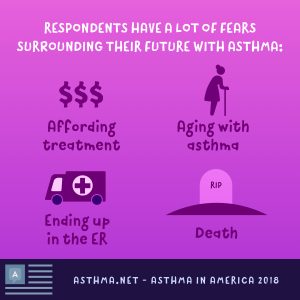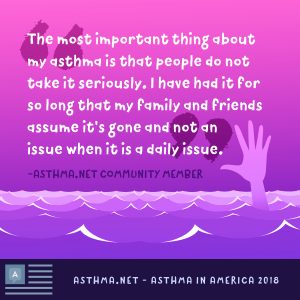What People Fear the Most About Their Future With Asthma
 At a time where 26.5 million Americans are living with asthma, there continues to be many misconceptions about the condition and the implications of dealing with it, long-term and on a daily basis. Health Union recently conducted a survey on Asthma.net to better understand what it’s like to live with asthma—Asthma In America 2018 asked questions about diagnosis, medications, treatments and more to over 800 respondents. Surprisingly, the survey revealed four things people with asthma fear most about their future, all of which have a profound impact on the way they view their condition and rate their quality of life.
At a time where 26.5 million Americans are living with asthma, there continues to be many misconceptions about the condition and the implications of dealing with it, long-term and on a daily basis. Health Union recently conducted a survey on Asthma.net to better understand what it’s like to live with asthma—Asthma In America 2018 asked questions about diagnosis, medications, treatments and more to over 800 respondents. Surprisingly, the survey revealed four things people with asthma fear most about their future, all of which have a profound impact on the way they view their condition and rate their quality of life.
Affording Treatment
Often a common concern for people who are living with any type of chronic condition, being able to manage what can sometimes be the high costs of doctor’s visits, prescriptions and treatments is top of mind for people diagnosed with asthma. Asthma In America 2018 found that 36% of the respondents said their asthma has had a significant negative impact on their household finances.1
Anonymous survey respondents shared their frustrations, writing:
“I am often unable to fill my medications due to cost. I fear if we do not pass universal health care, I will die of an asthma attack like my cousin did.”
“I worry about being able to obtain my medication, and whether I can afford it.”
“The cost to breathe should not be so high. It’s ridiculous!”
Coping with the fear of being able to financially manage asthma may mean building a nest egg for things other than retirement or education. “I have found myself thinking about whole different kinds of saving plans,” says Asthma.net writer and contributor Dia Sue-Wah-Sing. “This one is less for the renovations that I would like to do in my home or the vacations that I have on my bucket list. They are in relation to paying for medications.”
Aging with Asthma
 Two million adults over 65 in the United States live with asthma, and it is not uncommon for people to develop asthma symptoms for the first time in their 70s or 80s, or for those who had childhood asthma to go into a period of “remission” as adults and redevelop symptoms once they reach older adulthood.
Two million adults over 65 in the United States live with asthma, and it is not uncommon for people to develop asthma symptoms for the first time in their 70s or 80s, or for those who had childhood asthma to go into a period of “remission” as adults and redevelop symptoms once they reach older adulthood.
The average age of the survey respondents of Asthma In America 2018 was about 54 years old, and they had been diagnosed with asthma for an average of 25 years. Dealing with this condition for a long period of time, respondents look forward and plan for the future, feeling concern and trepidation for the journey ahead as they age. They shared concerns, such as “developing other health conditions that may have an effect” and remarking, “It will be hazardous to my health when I’m older. It will cripple my lifestyle.”
Kerri MacKay, a writer and contributor to Asthma.net, cautions patients, caregivers and physicians alike to understand the differences that older adults with asthma may experience in how their disease may look, or respond to treatment: “The more we know about our asthma, regardless of age, the better equipped we are to share our experiences with our care teams and take the steps needed to feel better.”
Ending up in the ER
Asthma attacks themselves can be frightening, but the fear of landing in the emergency room to handle an exacerbation tops the list for Asthma In America 2018 respondents. In fact, people who perceive their asthma as severe (32% of respondents) were more likely to have 10 or more exacerbations in the past year that resulted in an ER visit or using a short burst of steroids. Specific concerns included:
“I have been on a ventilator twice I am afraid next time I won’t wake up”
“I worry that I will have a severe attack and end up on respirator”
“Needing to be intubated”
It is also common for people with asthma to be concerned about the level of care they might receive when they do decide to visit the ER. “I know how bad my asthma can be- I’ve been intubated 3 times- I’m one of those asthmatics who is either completely 100% great or in serious trouble,” one commenter reveals on Asthma.net’s Facebook page. “And, I still hesitate to get care, because I don’t present as a textbook case and have gotten brushed off in the past. So, sometimes it gets really bad before I seek care.”
Death
Asthma, especially when it is uncontrolled or uncontrollable, can lead to significantly decreased lung function and severe or life-threatening exacerbations. According to the CDC, more than 3,600 people in the US died from asthma and its complications in 2015, and those who suffer from severe symptoms tend to fear the worst. Survey respondents mentioned:
“I have always had chronic, severe asthma for the majority of my life. I am frightened that it will get worse. I am frightened that my regular colds in the future may compromise my life because of asthma.“
“Getting the flu or another respiratory infection along with my asthma and dying”
People who deal with severe asthma complications share their experiences on Asthma.net’s Facebook page, citing many instances where they felt they narrowly avoided death. “I have learned through the years … NOTHING is more important than getting help as soon as possible,” writes a Facebook commenter. “One episode put me in the ICU for four days because I stayed at work … My air was at 86% and I almost died. Another time the clinic didn’t believe my asthma was bad, so back to work I go without a doctor’s note. Halfway through my day with students, with my lips blue, they call the school and tell me I have double pneumonia.”
—
If you or someone you know is living with asthma and shares similar fears to those revealed in Asthma In America 2018, visit the community at Asthma.net.
The newest data from Asthma In America 2019 survey can be seen here.
1Top 2 box on a 7-pt. scale



